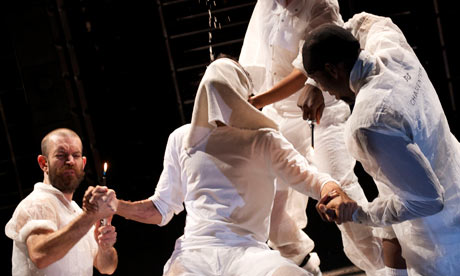Last night’s RSC performance of Troilus and Cressida left me feeling bewildered, confused, and
slightly foolish. The prospect of New York’s Wooster Group coming together with
the RSC seemed exciting. The experimental project, directed by Elizabeth
LeCompte (of NY) and Mark Ravenhill (of the RSC), brought Rupert Goold’s
original conception to fruition. Yet, somehow I wonder if this is the sort of
theatre even the controversial Goold would stand behind.
The production highlights the juxtaposition of Greek and
Trojan cultures, bring the Trojans to life as war torn Native Americans. The Wooster group attempted to theatrically
embody the ritualized and stereotyped Native American culture. While I do not
agree with all of their choices (I will explain this later) I do want to bring attention
to some of the critical receptions of the play - some of which have bashed The Wooster Group for all of the
wrong reasons.
Michael Billington of The Gaurdian wrote:
“Many past productions have highlighted the differences between the
chivalric Trojans and the pragmatic Greeks. That is pushed to the limit here
with LeCompte's actors all wired for sound, presenting the Trojans as beseiged
Native Americans. Politically, there is something questionable about modern
white Americans appropriating past tribal customs; and, however authentic the
war cries and dances, the actors can't help resembling extras in a Bob Hope
western.”
I would just like
to say to Mr. Billington that this is exactly the point. What audiences are failing to
recognize is that The Wooster Group was less authentic in their interpretation
of Native Americans and more stereotypical of the Hollywood ideal. This was expressed with
the multiple television screens which showed clips of Native American films
throughout the performance which the actors mimicked. As for the decision to
provide the actors with microphones, we only can speculate. Perhaps the Wooster
group, as Billington suggests, were unable to successfully fill the theatre
with their voices and therefore were placed on microphones to project their
voices. However, there was quite a bit of live music during their section,
which would have been virtually impossible to project over; and furthermore,
the moments that were occupied by silence and the lone actor were all the more eerie
because of the echoing effect – reminiscent of the echo across the
empty plain. But maybe that is too
generous.
What I did have a
major problem with was the performances of the Troilus and Cressida – both being
far too concerned with their exact replication of the video replay on the television
screens then with the text itself. Scott Shepherd (Troilus) and Marin Ireland
(Cressida) both gave a flat performance, devoid of meaning. Most importantly
they forgot to tell the story! I complete agree with Billington that “this production… is that it does nothing
to enhance our understanding of the play.”
On the flip side,
if you can call it that, the Greeks show stronger stamina in camouflage as
modern day soldiers. They certainly appear the stronger actors, not reliant on
microphones and elaborate stylization. Joe
Dixon comes to the stage with the right amount of flare and energy, presenting
the opposite of our imaginings of the heroic Achiles. Zubin Varla delivers
Thersites's narrative commentary in a wheelchair and dressed as a transvestite.
Of these, only Scott Handy as Ulysses delivers an intelligent performance
representative of the RSC. This is yet another example of the RSC trying to push the boundaries, but falling short.
The major
problem of the play was its lack of reliability – an alienation effect that
was probably semi-intentional. Nearly half of the audience walked out during
the performance. This was a failure on the audience’s part to accept art, in a
crowd heavily reliant on “traditional” and “authentic” Shakespeare. However,
there was also a failure on this productions ability to effectively tell the
story – an element fundamental to the enjoyment of a performance. My recomendation is to embrace experimental theatre, however hard it may seem.
Read more at
The Gaurdian and
The Telegraph.



















